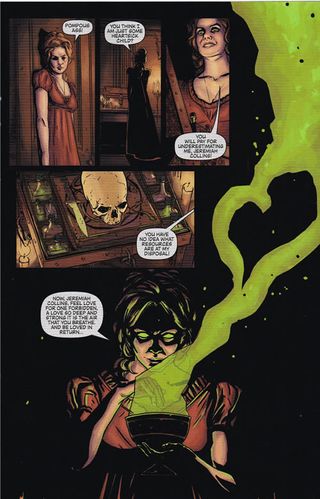 Zombos Says: Good
Zombos Says: Good
Dark Shadows, although it originally aired on network television beginning in the 1960s, still has a strong fan base and still remains a vibrantly brooding and evocative gothic tale of vampirism, witchcraft, and the supernatural realms. It's a love story, a ghost story, a werewolf story, a revenge story, and a story whose characters are damned or cursed or caught between the forces of both at any given moment.
At its heart is Angelique's unrequited love (or lust) for Barnabas Collins. This is the strongest element that comes through in Tim Burton's reimagining of the tale, and the only one worth our attention in his otherwise lame-o attempt at campy vampy self-indulgence–
–Which is why Dynamite's Dark Shadows Year One series is important. After the bad taste left by Burton's movie, and its sullying effect on newbies to this classic horror story, it's reassuring to see Dark Shadows reaffirmed as a serious entry in the gothic crawlspaces of terror.
And yes, the television series was bit of a campy hodgepodge, but that was due more to a low budget, little rehearsal time and no retakes, and a flair for the over-dramatic, rather than an intentional over the top scheming as seen in Adam West's Batman (which I still love, so don't snipe me on this).
Once you get past the annoying conceit of "Year One" used in comic book titles, and the gimmick of numerous first issue covers to boost sales while you (and me!) waste dollars buying each variant, Marc Andreyko and Guiu Vilanova pen and ink the background of Angelique's curse on Barnabas Collins and its deleterious effect on the Collins clan. Completing the effect is Josan Gonzalez's colors, giving the panels enough smoky lighting and dark spaces to bring us into the tight rooms of Collinwood and the gloomy climate of Collinsport. Dialog is suitable enough to the age without being ponderous and the smaller panel arrangements provide the necessary emotional momentum, if perhaps a little too quickly paced.
Barnabas's indiscretion is also potentially revealing as to his character before becoming a vampire. Just how much does he really love Josette? How much influence did Angelique's witchcraft play into it?
This first issue introduces Angelique's malevolence, but not precisely why she finds Barnabas so attractive. I'd like to see more of that in subsequent issues. What does she really want? is the question that drove the television series and will need to drive this series as well if it's to be successful at bringing us into the Dark Shadows ouevre; which appears never-ending, just like its fans.
